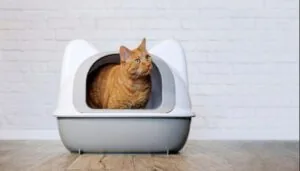Answers to the Most Commonly Googled Pet Questions

It’s natural to have lots of questions as a pet owner! We sought out the most commonly Googled pet questions (along with a few questions that we often get asked) and answered them below. Of course, these answers don’t take into account your pet’s individual health, so be sure to discuss any specific concerns with your vet!
Let’s dive right in!
Question #1: Is my pet too fat?
Uh Oh. Did your pet eat a little too much over the holidays? Maybe all of that sumptuous feasting left him a bit on the chubby side! Though pets are very adorable when pudgy; they, like humans, are actually in danger of many health problems if not helped out with a diet plan. To tell if your pet is a little too overweight for his health, compare your pet’s looks to the chart below! Called “Body Condition Scores,” charts like this one are believed by many to be the best way to tell if your animal is in good condition weight-wise.

Question #2: Why does my dog eat grass?
Dogs eat grass to satisfy dietary needs or to provide treatment for themselves when feeling sick. Usually, you don’t have to worry about any harm coming to your pet if he eats grass, but as a good pet owner you do want to ask yourself “why” if you see him doing so! Perhaps the diet he is currently on is not providing him the nutrients he needs; so he is looking for those needs to be met with the grass that he eats.
Also, a dog who feels sick to his stomach may find a quick natural remedy for this by eating grass. However, if your pet starts to suddenly eat grass in large amounts, take him to the vet right away: experts advise this course because such activity can likely mean he has something very wrong with him and is trying to help himself.
Question #3: My older dog seems to have dementia…Is this possible?
According to PetMd, 50% of dogs over the age of 11 shows signs of cognitive decline (which some might refer to as dementia). So the answer to your question is a yes: it is possible for an older to dog to suffer from cognitive decline/dementia.
If your dog has some of the symptoms listed in this article or any of the ones listed below, you may want to mention it to the vet during checkup, so he can test for Cognitive Dysfunction Syndrome.
- Seems lethargic
- Not interested in usual activities
- Change in sleeping patterns
- Seems confused
CDS is not curable, but the symptoms can be treated. Sometimes, our dogs just get old; and when that happens, it seems their old bodies cannot behave like when they were young. There are some things you can do however to help your pet in this situation. When a diagnosis is given, you as the owner can choose to either purchase medication for your pet to help slow the decline or go with therapy options. Both options, especially if used together, can be of great help to your pet!
Question #4: When should I give my pet medication for heartworm, fleas, or ticks?
It is always best to consult with your vet regarding any specific pet medication question; that being said, there are some general guidelines you can follow regarding these three types of common treatments.
- Heartworm medication should be provided for pets on a consistent basis by the time they reach the age of six months. This is especially relevant for areas of the globe, like North America, where mosquitoes, the carriers of heartworm, are relatively prevalent.
- Flea medication can be applied as a preventative or on an as-needed basis, i.e., when infestation occurs! There are various types of flea medication including pills and ointment. Some work better than others, so talk to your vet!
- Much of the time, medications on the market combat both ticks and fleas at the same time. So when should you invest in these types of pills? Some people try to be proactive in fighting off these pests since ticks especially can be very harmful for our pets if they pounce. During the months of summer and spring, the likelihood of infestation is at it’s highest, but that doesn’t mean the bugs won’t show up when the weather gets cold! A breakdown of this winter tick and flea reality can be found here in an article by PetMD. Though fleas and ticks are less prevalent at certain times to be sure; during winter, medication is still a good idea.
Question #5: Should I brush my pet’s teeth?
The answer to this question is a resounding yes! It is very important to brush your pet’s teeth on a regular basis, using pet toothbrushes and pet toothpaste of course! You may want to know why teeth cleaning is so important. See the facts below to further understand why your pet needs his pearly whites in mint condition!
- Signs of teeth and gum diseases begin occurring in 80% of dogs after reaching the age of 3. Cats also face risk of developing dental disease, the most common of these being Periodontal disease.
- Because of the facts above, veterinarians recommend yearly professional cleanings, especially as your pet gets older, along with daily brushing by pet owners to combat this.
- The serious effects of dental problems can be prevented by proactive, preventative care. Help your pet with his beautiful smile; in doing so you will be promoting overall good health!
Question #6: How often should I give my pet a bath?
For Cats:
- You want to give your outdoor cat a bath about once per month, but this can also depend on your cat’s lifestyle. If your cat comes home covered in mud the week after his last bath…you may need to break the rule and help him clean up again!
- Also, you may have to give your cat a bath if he acquires fleas. In this case, you would just need to get a flea-ridding shampoo for the process. When bathing your cat, don’t forget to be gentle and to use warm water followed by a soft, warm towel dry!
For Dogs:
- Just like for cats, the recommended frequency for washing your dog is once a month. It is important to remember that washing your pup more frequently than this could cause his skin to get too dry for comfort.
- If the need arises for you to give him a second bath, try to use only water for the wash or a shampoo that provides moisture for his skin!
Question #7: What should I do the day before a surgery for my pet?
This question arises quite often since many pets have to undergo surgery at least once or twice in their life. How can you do the right thing as a pet parent to ensure the best outcome? See the tips below to prepare your pet:
- Make sure your pets get plenty of rest in the days preceding the surgery. You don’t want them to be over-exercised or lacking in sleep before an intense procedure!
- Find out from your vet if it is okay for your pets to take their regular medication in the weeks preceding the surgery.
- Usually, adult pets should not eat anything the evening and morning before the surgery, though it is usually okay to let them drink water. Kittens and puppies on the other hand might need a light meal the morning of a surgery as their tiny size makes them weaker and less able to stand for long periods without food.
- Keep in mind that some surgeries may have unique elements with situational-specific preparations necessary, so make sure to have a thorough consultation with your vet beforehand to find out specifics for your little friend!
Question #8: Is there a way I can stop my dog from digging holes in the yard?
Hole digging can pose a huge problem for pet owners! Our furball friends often love to dig up the yard at times; and to them, digging through the flower beds seems to be just as fun—if not more so—than digging through other, less glorious parts of the lawn. We want our pets to have fun, but we all know there have to be better ways!
So, the solution? You can always go the tried-and-true route of monitoring your dog outside. With you in the yard, preventing damages becomes as simple as a “Rambo, No!” However some experts suggest providing a place for your dog to dig! Encouraging him to enjoy his possibly favorite hobby with guidelines could be the happiest solution for you both!
Question #9: Why does my dog sometimes eat his own feces!
The reality is, some canines just do this. It is rather gross and of course alarming! But why exactly is a dog motivated to eat poop when he has plenty of other options to choose from? Most authorities seem to agree on two causes:
- An animal might eat his feces or that of another pet when he feels that he needs some kind of vitamin that is lacking in his diet.
- A pet might do this when he has “messed up” by pooping in the house. The theory is that the pet understands he might get in trouble for his action and therefore eats up the poop to hide the evidence!
So, the solution! Clean up quickly after your pets, and also find out from your vet the best options for food supplements that can keep this from happening in the future!
Question #10: Why does my pet urinate and drink a lot?
There are several reasons why your pet may be drinking extra water and urinating frequently. Some of them are rather serious, so if you notice changes in this type of activity do speak with your vet. Following is a list of possible reasons:
- Your pet could be pregnant. This would not necessarily cause your pet to drink more, but it would put pressure on the body that does not allow for long retention of urine.
- Your pet could have diabetes, liver disease, or Cushing’s disease. All of these three health issues would likely lead to your pet drinking and urinating more frequently.
As a general rule, a pet who starts drinking more and urinating more than usual should go to the vet because such activity is often an indicator of potentially serious health issues.
Question #11: Can I give my pet Benadryl for allergies?
Benadryl is a very common treatment option to help pets with allergies and other problems. So yes, it is okay to give your pet these pills.
However, you need to consult with a vet about dosage amounts and whether your pet in particular would benefit from the medication. Generally, dogs and cats are given proper dosage amounts based on their size, so find out from your pet doctor just how much your pet may need.
. . .
Now that we have answered some of the most Googled, as well as the most frequently asked questions at vet offices, we hope you feel more knowledgeable and equipped as an informed pet parent!
Share This Post
Recent Posts
About Shallowford Animal Hospital
Shallowford Animal Hospital and The Pet Spa at Shallowford are dedicated to the exceptional, compassionate care your pet deserves. Pets hold a very special place in our families, and we treat yours like our own.



